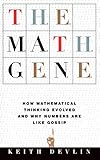

Fai clic su di un'immagine per andare a Google Ricerca Libri.
|
Sto caricando le informazioni... Il gene della matematica (2000)di Keith Devlin
 Nessuno Sto caricando le informazioni...
Iscriviti per consentire a LibraryThing di scoprire se ti piacerà questo libro. Attualmente non vi sono conversazioni su questo libro.   ) )In 'Das Mathe-Gen' geht es nicht um ein wirklich vorhandenes Gen im biologischen Sinn. Keith Devlin benutzt den Begriff, um seinen Lesern seine Theorie zu erklären, dass Mathematik eigentlich eine angeborene Fähigkeit ist und mit der Sprache gemeinsame biologische Wurzeln hat. Im Buch beschreibt Devlin verschiedene Theorien zum Spracherwerb und warum wir überhaupt Sprache nutzen können. Von der Vergrößerung des Hirnvolumens als Voraussetzung bis hin zu der einfach erscheinenden Fähigkeit von Kleinkindern grammatisch korrekte Sätze zu bilden und Sprache überhaupt zu verstehen, handelt ein Teil des Buches. Aber wäre dies alles, wäre dieses Buch kein Plädoyer für die Mathematik sondern ein Buch für sprachwissenschaftlich interessierte Leser. Devlin zählt weiter Ergebnisse von Experimenten und Tests auf, die zeigen, dass auch andere Tiere und Kleinkinder einen angeborenen Sinn für Mengen besitzen. Des Weiteren werden Abstraktionsvermögen, ein Sinn für die Mustererkennung und ein räumlicher Orientierungssinn für die Mathematik benötigt alles Fähigkeiten die der Mensch auch bei der Bildung von Sprache tagtäglich braucht. Devlin bringt seine Theorie auf anschauliche Weise seinen Lesern näher und erklärt auch noch, warum Mathematik eine Seifenoper ist. In 'Das Mathe-Gen' geht es nicht um ein wirklich vorhandenes Gen im biologischen Sinn. Keith Devlin benutzt den Begriff, um seinen Lesern seine Theorie zu erklären, dass Mathematik eigentlich eine angeborene Fähigkeit ist und mit der Sprache gemeinsame biologische Wurzeln hat. Im Buch beschreibt Devlin verschiedene Theorien zum Spracherwerb und warum wir überhaupt Sprache nutzen können. Von der Vergrößerung des Hirnvolumens als Voraussetzung bis hin zu der einfach erscheinenden Fähigkeit von Kleinkindern grammatisch korrekte Sätze zu bilden und Sprache überhaupt zu verstehen, handelt ein Teil des Buches. Aber wäre dies alles, wäre dieses Buch kein Plädoyer für die Mathematik sondern ein Buch für sprachwissenschaftlich interessierte Leser. Devlin zählt weiter Ergebnisse von Experimenten und Tests auf, die zeigen, dass auch andere Tiere und Kleinkinder einen angeborenen Sinn für Mengen besitzen. Des Weiteren werden Abstraktionsvermögen, ein Sinn für die Mustererkennung und ein räumlicher Orientierungssinn für die Mathematik benötigt alles Fähigkeiten die der Mensch auch bei der Bildung von Sprache tagtäglich braucht. Devlin bringt seine Theorie auf anschauliche Weise seinen Lesern näher und erklärt auch noch, warum Mathematik eine Seifenoper ist. nessuna recensione | aggiungi una recensione
Premi e riconoscimenti
Why is math so hard? And why, despite this difficulty, are some people so good at it? If there's some inborn capacity for mathematical thinking--which there must be, otherwise no one could do it --why can't we all do it well? Keith Devlin has answers to all these difficult questions, and in giving them shows us how mathematical ability evolved, why it's a part of language ability, and how we can make better use of this innate talent.He also offers a breathtakingly new theory of language development--that language evolved in two stages, and its main purpose was not communication--to show that the ability to think mathematically arose out of the same symbol-manipulating ability that was so crucial to the emergence of true language. Why, then, can't we do math as well as we can speak? The answer, says Devlin, is that we can and do--we just don't recognize when we're using mathematical reasoning. Non sono state trovate descrizioni di biblioteche |
Discussioni correntiNessunoCopertine popolari
 Google Books — Sto caricando le informazioni... Google Books — Sto caricando le informazioni...GeneriSistema Decimale Melvil (DDC)510.1Natural sciences and mathematics Mathematics General Mathematics Philosophy And PsychologyClassificazione LCVotoMedia: (3.8) (3.8)
Sei tu?Diventa un autore di LibraryThing. |
||||||||||||||||||||||||||||||||||||||||||||||||||||||||||||||||||||||||||||||||||||||||||||||||||||||||||||||||||||||||